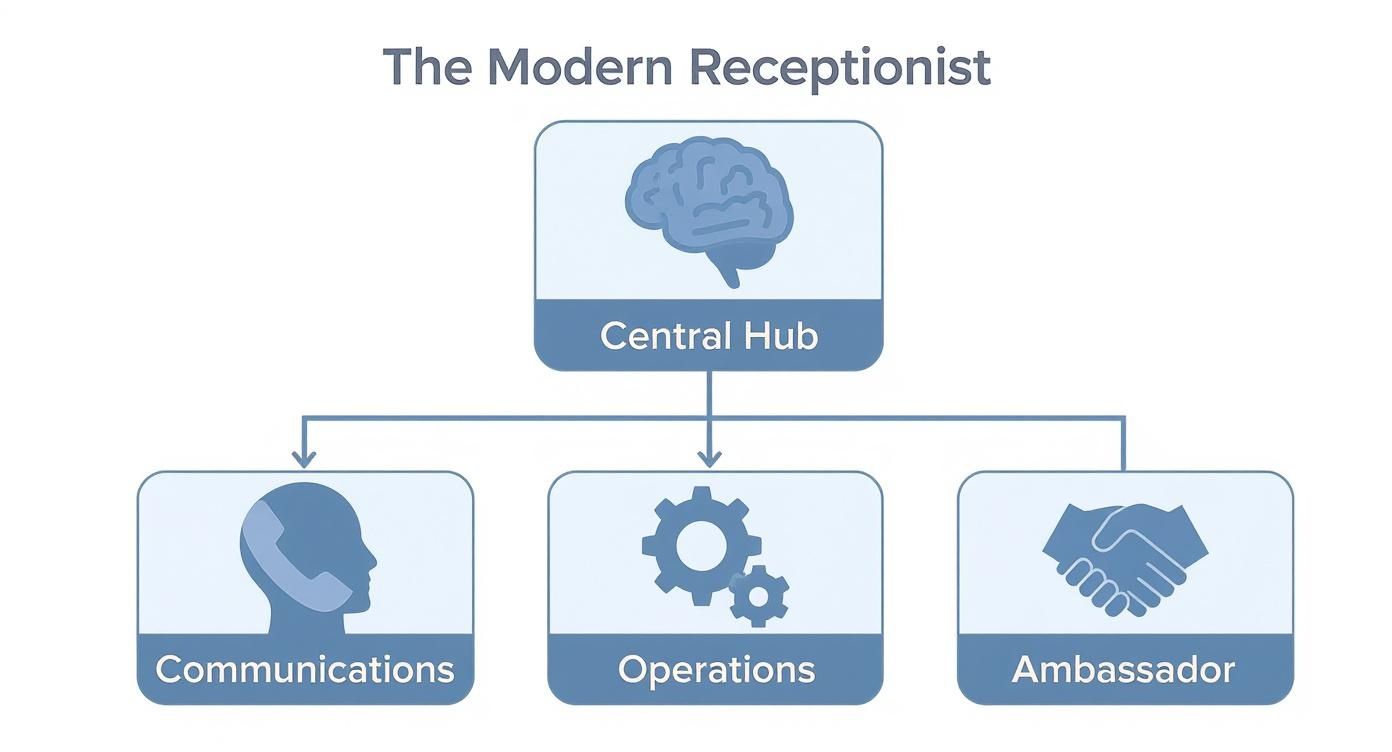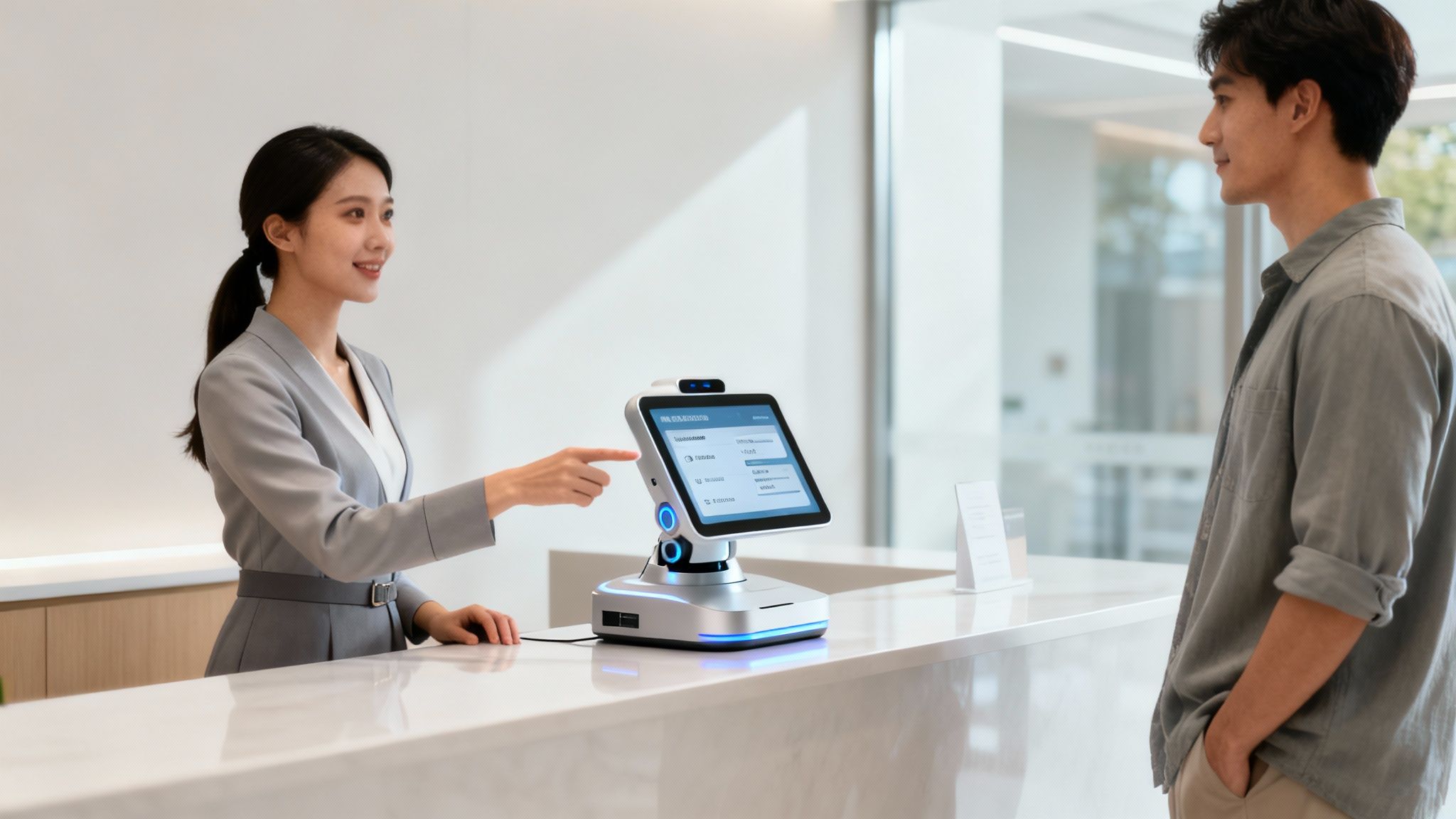When you think of a receptionist, what comes to mind? For many, it’s the person at the front desk who greets visitors and answers the phone. But that’s just scratching the surface. A receptionist is really the first, and often most important, point of contact for any business, setting the tone for every interaction that follows. They’re the heart of the front office, blending sharp administrative skills with top-notch customer service to make sure everything runs like a well-oiled machine.
The Modern Receptionist: More Than Just a Friendly Hello
Let's ditch the old-fashioned image of someone simply taking messages. Today's receptionist is the central hub of the entire organisation. Think of them less as a gatekeeper and more like an air traffic controller for the business—expertly directing the flow of people, information, and communication.
This role has grown well beyond a simple greeting. The modern receptionist is a true brand ambassador, shaping a customer's entire perception of the company from the moment they call or step through the door. It’s a demanding job that requires a unique mix of people skills and organisational talent.
The receptionist is the face of the company. It is his/her responsibility to provide top-notch customer service and make a good first impression.
A Backbone of the Workforce
You can see just how crucial this role is by looking at the numbers. Receptionists are a cornerstone of the Australian economy, working across all sorts of industries, from local clinics to massive corporate headquarters. As of August 2025, there were about 187,000 receptionists employed across Australia. The role also offers real flexibility, with 90% being female and 57% working part-time.
For many, it's also a fantastic launchpad for a career, building essential skills that are valuable anywhere. We're talking about:
- Communication: Getting really good at handling phone calls, emails, and face-to-face chats.
- Organisation: Juggling schedules, appointments, and a whole host of admin tasks without breaking a sweat.
- Problem-Solving: Thinking on your feet to handle unexpected hiccups with a cool, professional head.
As businesses using solutions from partners like

know all too well, getting that frontline communication right is absolutely critical for success.
What a Receptionist Actually Does Day-to-Day
So, what does a receptionist really do all day? If you’re picturing someone just answering the odd phone call, you’re missing the bigger picture. A great receptionist is the organisational backbone of the office, juggling a surprising number of critical jobs all at once.
Their world really breaks down into three key areas: being the communications hub, managing the visitor experience, and providing rock-solid administrative support.
This infographic gives you a great visual on how these distinct jobs come together, placing the receptionist right at the centre of the action.

As you can see, it's not just about one task. Communication, operations, and being a brand ambassador are all interconnected duties that flow through the modern receptionist.
The Communications Hub
At its heart, the role is all about managing the flow of information. We're not just talking about answering the phone; it’s about expertly operating multi-line phone systems, screening and directing calls with precision, and being the first friendly voice for anyone getting in touch, whether by phone, email, or in person.
The Visitor Experience Manager
Creating a welcoming and professional vibe from the second someone walks in the door is another massive part of the job. This goes way beyond a simple "hello." It involves managing guest sign-ins, making sure security protocols are followed, and ensuring every visitor feels comfortable and looked after from arrival to departure.
A great receptionist understands they are not just managing a desk, but orchestrating the entire first impression of the company. Their ability to remain calm and organised under pressure directly impacts the client and visitor experience.
The Administrative Pillar
Finally, receptionists provide the essential admin support that keeps the whole office ticking over smoothly. It's an incredibly diverse skill set, covering everything from greeting visitors and managing calls to scheduling appointments and handling crucial backend support. The typical salary for a receptionist in Australia, ranging from $64,000 to $70,500, reflects just how broad these responsibilities are. You can dive into more detailed receptionist salary insights to get a feel for the role's true value.
To really get a sense of it, let's break down a typical day.
A Day in the Life: A Receptionist's Key Duties
This table gives you a functional breakdown of their primary responsibilities, showcasing the diverse nature of the modern front desk professional.
| Functional Area | Key Tasks and Responsibilities |
|---|---|
| Communications | Answering and directing phone calls, managing email inboxes, relaying messages. |
| Visitor Experience | Greeting guests, managing sign-in procedures, maintaining a tidy reception area. |
| Administrative Support | Scheduling meetings, data entry, mail distribution, ordering office supplies. |
As you can see, it's a role that demands a unique blend of people skills, organisational prowess, and the ability to multitask without breaking a sweat.
The Essential Skills Every Great Receptionist Has

Being great at the front desk doesn’t just happen by accident. It's a careful mix of people skills and technical know-how. To really get what a modern receptionist does, you have to look past the job description and into the practical abilities that let someone truly shine in this juggling act of a role.
At the heart of it all is communication. I'm not just talking about being friendly—it's about active listening to figure out what a visitor really needs and being able to write a sharp, professional email. A top-notch receptionist can cool down a tense phone call just as easily as they can draft a clear message for the management team.
Mastering the Human Element
Beyond just talking and writing well, there are some high-level soft skills that are absolutely non-negotiable. These are the abilities that separate a good receptionist from a truly great one, helping them handle the unpredictable human side of a busy office with a bit of grace.
-
Emotional Intelligence: The knack for reading a room and responding with empathy is huge. Whether it’s a frustrated client on the phone or an anxious job candidate in the lobby, a skilled receptionist knows how to manage emotions and keep the atmosphere professional.
-
Proactive Problem-Solving: Let’s be real, unexpected issues are just part of the daily routine. A great receptionist doesn't just flag problems; they see them coming and sort them out before they blow up, turning a potential hiccup into a non-event.
-
Unflappable Composure: The front desk can feel like a pressure cooker. Juggling ringing phones, waiting visitors, and urgent admin tasks all at once requires a calm and organised approach. Staying cool under pressure is the hallmark of a real pro.
A great receptionist possesses a unique blend of composure and competence. They are the calm centre of the office storm, directing traffic with a steady hand and ensuring every interaction reflects the company's best self.
The Modern Receptionist's Tech Toolkit
While people skills are the foundation, tech-savviness is what keeps the whole operation running smoothly. Today’s receptionist has to be comfortable with a whole suite of digital tools.
This means mastering office software for creating documents and managing calendars, confidently handling modern VoIP phone systems for tricky call routing, and knowing their way around CRM software to keep client information organised. These tech skills are what ensure everything on the operational side gets done quickly and accurately.
Your Career Doesn't Stop at the Front Desk—It Starts There
Lots of people think the receptionist role is just a stepping stone, something you do while you figure out what you really want to do. But that couldn't be more wrong. The front desk isn't a dead end; it's one of the best launchpads for a serious career.
Think about it. You're essentially getting paid to learn the ins and outs of a business. Every call you take, every person you greet, and every little fire you put out builds a solid foundation in communication, organisation, and problem-solving. These aren't just 'admin' skills—they're the exact same skills that make a great leader in any field. A sharp receptionist gets a unique bird's-eye view of how the entire company operates.
From Answering Phones to Running the Show
All that hands-on experience is gold. It opens up doors you might not even have considered because the skills you pick up are so versatile and valuable for more senior roles.
It's pretty common to see receptionists move into positions like:
- Office Manager: Stepping up to manage the whole workplace, from vendors to leading the admin team.
- Executive Assistant: Becoming the right-hand person for a C-suite exec, juggling complex schedules and coordinating high-stakes business activities.
- Administrative Coordinator: Taking charge of projects for specific departments and making sure everything flows smoothly between teams.
The receptionist role is like a masterclass in how a business really works. You figure out who the key players are, how different teams work together, and what it takes to keep things moving. That's invaluable insight for anyone aiming for a leadership position.
And it doesn't stop there. This role can be a fantastic springboard into completely different fields. A receptionist who's a natural at chatting with clients could easily slide into a Client Relations or Sales Support role. Love organising the company Christmas party? You might have a future in Event Management. And because you're constantly interacting with new hires and staff, a move into Human Resources is a super common and logical next step.
So no, it’s not just a job. It's the start of a seriously rewarding career.
The Future of the Front Desk: The Rise of the AI Receptionist

Let’s get one thing straight: technology isn’t here to make receptionists obsolete. If anything, it’s making them more crucial than ever. The introduction of artificial intelligence is completely changing the game at the front desk, shifting the focus away from mundane, repetitive tasks and towards high-value human connection.
Think of an AI receptionist not as a replacement, but as a seriously capable co-pilot. These smart systems are brilliant at handling the time-consuming jobs that can easily bog down a busy front office, freeing up people to do what people do best.
The Human and AI Partnership
An AI-powered system can tirelessly manage a whole range of essential duties. This tag-team approach creates a front office that’s not just more efficient, but far more responsive to customer needs.
- Automated Call Routing: AI can instantly figure out who a caller needs to speak to and send them to the right person or department, cutting out the need for manual transfers.
- 24/7 Appointment Booking: Clients can schedule, change, or cancel appointments whenever it suits them—no more waiting for business hours to get in touch.
- Instant FAQ Answering: Common questions about opening hours, location, or services? An AI chatbot can handle those in a flash, providing immediate answers.
With these administrative headaches taken care of, the human receptionist can dedicate their energy to building relationships, solving complex guest problems, and providing that warm, personal touch that technology simply can't replicate. It's a win-win that elevates the entire customer experience.
By automating routine tasks, AI empowers receptionists to focus on the uniquely human aspects of their role, such as empathy, complex problem-solving, and building genuine client rapport.
This synergy is where the real magic happens. To see how companies are pioneering this space, check out the Parakeet AI homepage. And for a practical look at how automation is changing communication, tools like the OnSilent smart voicemail app are a great example of this shift in action. https://onsilent.com/wp-content/uploads/2025/04/download-onsilent-smart-voicemail-apple-app-store-300×94.webp
Why the Receptionist Role Is More Important Than Ever
Think the receptionist role is on its way out? Think again. Far from becoming a relic of the past, the modern receptionist has evolved from a simple gatekeeper into the operational heart and cultural cornerstone of a business. They’re the first hello, the face of the company, and the person who shapes every single first impression. It’s a powerful mix of brand ambassadorship and administrative savvy.
Whether you have a person at the front desk, an AI-powered system, or a combination of both, the function of a receptionist is absolutely critical. Technology is brilliant at handling the repetitive stuff, which frees up human receptionists to focus on what they do best: creative problem-solving and building real, genuine relationships with clients. Those are skills that no tech can truly replicate.
As we're seeing with innovations coming out of places like Australia's National AI Centre, the future isn't about replacement; it's about partnership.
At the end of the day, the receptionist role has proven its staying power time and time again. It just keeps adapting, making sure that a human touch always remains right there at the company’s front door.
Got Questions? We've Got Answers
Thinking about a career as a receptionist or looking to hire one? It's a role that often brings up a lot of practical questions. Let's clear up a couple of the most common ones.
What Qualifications Do I Really Need?
The great thing about becoming a receptionist is that there isn't a long list of rigid qualifications, making it a super accessible career path. Most businesses will look for a high school diploma as a starting point.
But what they really care about are your skills. Can you communicate clearly? Are you organised? Are you comfortable with technology? On-the-job training is the norm, so you’ll learn the company's specific systems as you go. Of course, having a handle on software like Microsoft Office gives you a definite head start. For a deeper dive into the role, including day-to-day duties and career pathways, check out this detailed profile for Receptionists and Information Clerks.
Will AI and Robots Make Receptionists Obsolete?
This is a big one, but the short answer is a definite no. While AI is brilliant at handling repetitive tasks like routing calls or booking simple appointments, it can't come close to replicating the human touch a great receptionist provides.
Think of technology as a partner, not a replacement. Automation frees up receptionists to tackle the tricky stuff—like complex problem-solving, building real client relationships, and navigating those nuanced situations that call for a bit of empathy and quick thinking.
The future of the front desk isn't about replacing people with machines. It's about combining human expertise with smart technology to create a better experience for everyone.
Ready to see how AI can give your front desk superpowers and save you hours every week? Find out what OnSilent can do for your business at https://onsilent.com.

